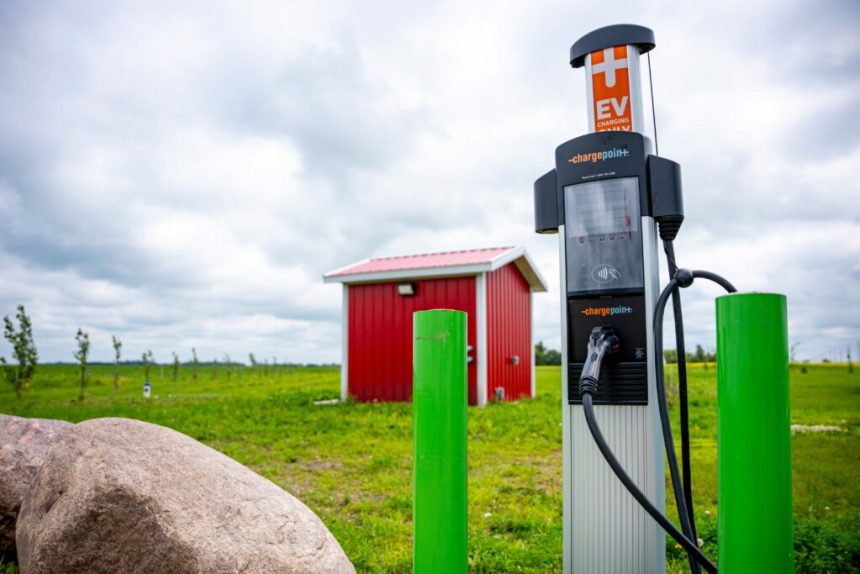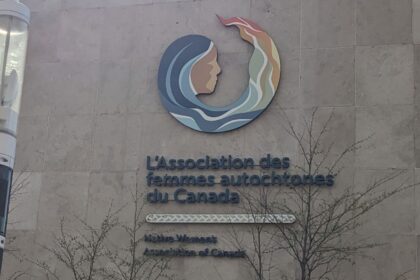The Manitoba government plans to build a network of six high-powered electric vehicle charging stations between Winnipeg and Thompson in the coming years as part of an ambitious roadmap to lead the province to net-zero emissions. Filling the gaps in the province’s electric vehicle infrastructure is a highlight of the New Democratic Party’s all-hands-on-deck effort to curb Manitoba’s carbon emissions by 2050. The full plan will be announced Monday morning. In an exclusive interview, Environment and Climate Change Minister Mike Moyes said he’s hopeful the new charging infrastructure will give more Manitobans, particularly those living in the province’s northern and remote communities, confidence to make the switch to low-emission vehicles. As electric vehicles rise in popularity, advocates see a path forward for rural and remote communities like those in northern Manitoba to make the switch. Photo: Nic Adam / Winnipeg Free Press “This is a way that we’re trying to connect people, connect different communities and really decrease that range anxiety, which we know is one of the reasons why people are sometimes unsure about whether it’s the right fit for them and their family,” he said. The new level-three chargers — which can fill an electric vehicle battery in 20 to 30 minutes — will bring the total number of charging stations across the province to nearly 300. Critically, they’ll add to the dozen existing stations in northern Manitoba. “It’s going to be a quick way for people to charge up their EVs,” Moyes said. “We recognize that transportation is one of the major sectors of emissions and something that we need to decarbonize, so we want to make sure that people have the confidence they need to either leave the city, for one, or to consider buying an EV if they’re in the market.” While exact locations are yet to be decided, the chargers are expected to be installed about 150 kilometres apart in the Manitoba communities of Lundar, Saint Martin, Grand Rapids, Ponton, Wabowden and Thompson, nearly 800 kilometres north of Winnipeg. Moyes said the infrastructure will cost approximately $9.2 million, and will be fully operational by April 2027. Environment and Climate Change Minister Mike Moyes charges his electric vehicle. Building out the province’s electric vehicle infrastructure is an integral part of the NDP government’s plan to curb Manitoba’s carbon emissions by 2050. Photo: Supplied by Manitoba Environment and Climate Change The announcement builds on a $500,000 commitment, made earlier this year, to support the construction of 51 chargers across southwestern Manitoba. The six new stations are the first to be publicly owned and overseen by Manitoba Hydro, the Crown provincial utility. Moyes said the public ownership signals the province’s “great confidence” in the future of electric vehicle technology. Experts agree a robust network of charging infrastructure is critical to encouraging electric vehicle adoption. An auditor general review of the federal government’s charging infrastructure program in 2023 found “many areas of the country still lacked access to public charging stations,” with northern, rural and Indigenous communities facing the steepest infrastructure gaps. Speaking with the Winnipeg Free Press and The Narwhal in 2024, Kent Heinrich, co-founder of the Manitoba-Ontario Free Ride EV educational program, suggested a network of chargers on the 760-kilometre route between Winnipeg and Thompson could be the first step toward making the technology accessible to all Manitobans. “The beauty of it is: once the roadway has charging ability, then people within the communities north, east and west of the highway within a certain range can now take part in the provincial rebate program,” Heinrich said at the time. That’s exactly what the province is aiming to do. “We’re trying to map everything out and ensure that we’re connecting as much of the province as possible,” Moyes said. Despite the barriers to EV adoption, from range anxiety and concerns about cold-weather performance to the drying-up of federal rebate funds earlier this year, Moyes said the uptake in Manitoba has been steady. The new fast-charging stations will bring the total number of stations across Manitoba to nearly 300, and add to the dozen already in use in the province’s north. The infrastructure is set to be fully operation by April 2027. Photo: Mikaela MacKenzie / Winnipeg Free Press More than 4,000 families have applied for the provincial rebate, which offers up to $4,000 toward the purchase of a new electric car, Moyes said. Funding is expected to continue until March 2026, or whenever the $25 million funding pot runs dry. “This is such a great opportunity to move Manitoba’s economy into the next phase toward a low-carbon economy, so we’re excited to bring forward this path to net zero,” Moyes said. More details about Manitoba’s plan to reach net-zero emissions by 2050 — which Moyes called a “comprehensive” and “over-arching” strategy involving all corners of government — will be released at an announcement Monday morning, with detailed action plans to follow. Concerns around electric vehicle adoption in northern communities include range anxiety — fear that the battery charge won’t last long enough to reach a destination — and cold-weather performance. But with expanded charging station infrastructure and ever-improving car models, EVs promise a cleaner, more accessible option for many remote communities. Photos: Carrie Davis / The Narwhal The roadmap will tackle Manitoba’s most polluting sectors, including transportation, agriculture and building heat. Moyes said his department’s latest data shows just over 30 per cent of emissions stem from the transportation sector. “We know that we have to do our part. More and more Manitobans were feeling the effects of climate change in the summer with the wildfires and the smoke that was in the air, so anything we can do to be leaders in this area goes a long way.” Julia-Simone Rutgers is a reporter covering environmental issues in Manitoba. Her position is part of a partnership between The Narwhal and the Winnipeg Free Press. Recent Posts New publicly owned electric vehicle charging stations will link remote, northern communities Remote regions have long had less access to EV infrastructure. A new investment from the… For people, for the land: a busy park has a moment to rest An Instagram-famous park near Whistler, B.C., took a break from the crowds in recent weeks…. Ontario drafts special economic zone rules around ‘the opinion of the minister’ The Doug Ford government’s pitch for fast-tracking development under Bill 5 empowers cabinet and dismisses…
New publicly owned electric vehicle charging stations will link remote, northern communities










